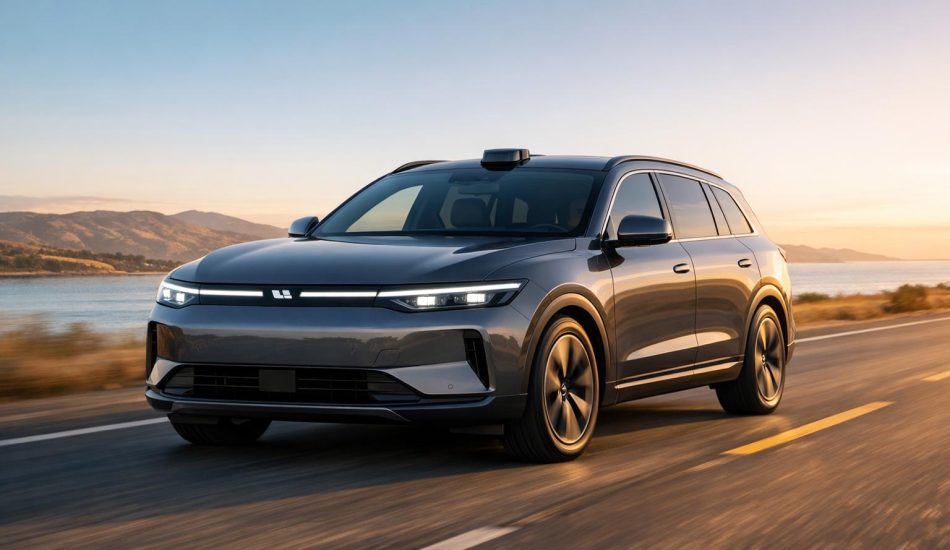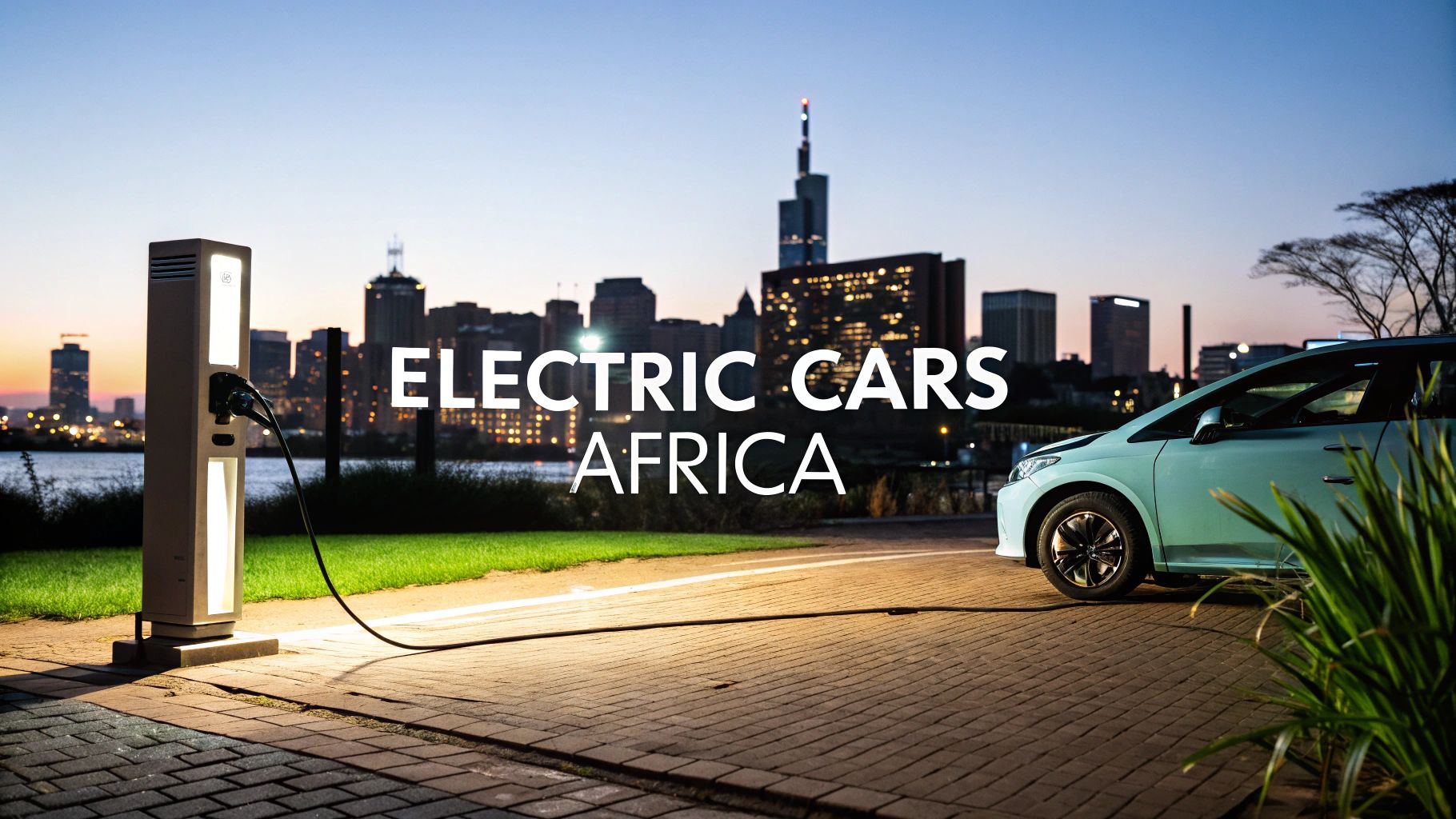
Finding electric cars for sale in Africa isn't the challenge it used to be. As the continent steers towards a cleaner, quieter future, the market is opening up. New government incentives, expanding charging networks, and a much wider selection of vehicles are finally making the switch to electric a real, practical choice for many of us.
The EV Revolution Arrives in Africa
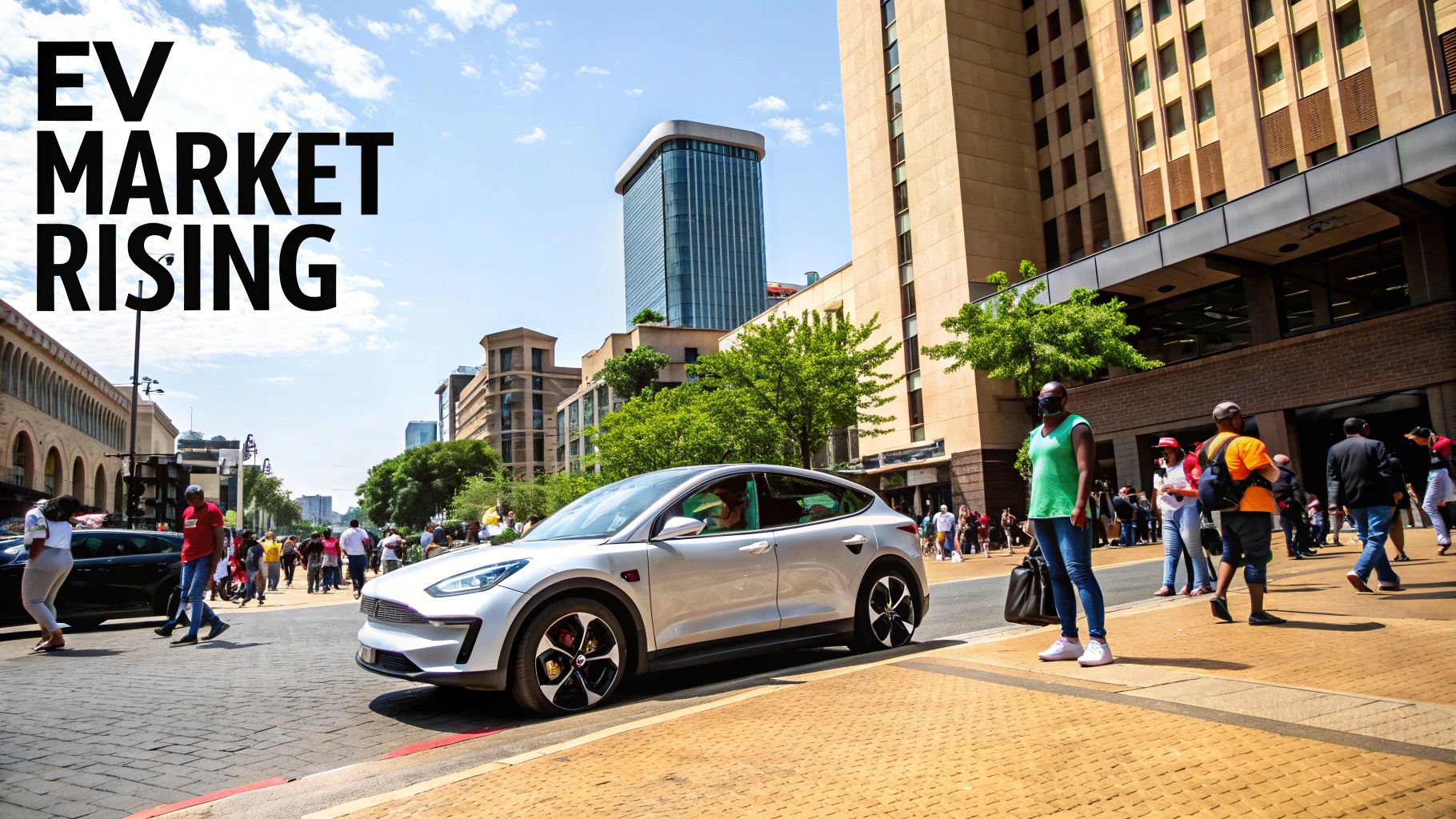
Across Africa's vibrant cities and beautiful landscapes, the quiet hum of electric motors is slowly but surely taking over from the roar of petrol engines. This isn't just a passing trend; it's a genuine shift in how we think about getting around. For a long time, electric vehicles (EVs) felt like something from a distant future, but they're here now, and they offer a compelling alternative to the cars we've always known.
Think of this guide as your personal map for this exciting new territory. We'll cut through the global headlines and focus on what the EV transition actually means for you, the African driver. Forget the complicated jargon and confusing stats—our aim is to give you clear, practical information to help you make a decision you can feel good about.
Understanding the Shift
So, why is this happening now? A few key things are coming together to create the perfect conditions for the electric wave to build. These factors are making EVs more accessible, more affordable, and frankly, a more sensible choice for everyday life.
- Government Support: Many African governments are now actively encouraging people to go electric with some very helpful financial perks. This often means reducing or even completely getting rid of import duties and offering tax breaks, which can seriously lower the initial cost of buying an EV.
- Economic Advantages: We all know how unpredictable fuel prices can be. The idea of "fuelling up" your car with electricity for a fraction of the cost is a huge draw. Plus, with no oil changes, spark plugs, or exhaust systems to worry about, the long-term savings on maintenance really start to add up.
- Infrastructure Growth: We're seeing more and more investment, from both public and private sectors, in building out charging infrastructure. While it's still a work in progress, the network is definitely growing in major cities, making it easier to top up your battery while you're out and about.
The African electric vehicle market as a whole is picking up speed, and the numbers show it. Projections suggest that by 2025, Africa's EV market revenue will hit around $209.9 million from an estimated 2,270 units sold. It's expected to keep growing at about 10.6% each year through 2029. You can dive deeper into the EV sales forecasts in Africa at EV24.africa.
This guide will walk you through the entire process, from figuring out the real costs and benefits to finding the right model and handling the purchase itself.
Why Going Electric Makes Sense in Africa
Forget the global hype for a moment. What are the real, on-the-ground advantages of owning an electric vehicle in Africa? The benefits are far more practical than you might think, going way beyond just environmental talking points.
Imagine this: no more weekly queues at the petrol station. Instead, you just wake up to a "full tank" every single morning, ready to go.
For most people, the biggest draw is the money you save. Fuel prices are a rollercoaster, and the cost of running a petrol or diesel car can eat a massive hole in your budget. When you switch to an EV, your running costs are tied to electricity, which is far more stable and a whole lot cheaper.
We're not talking about small change here; it’s a massive saving over the life of the car.
Fuel and Maintenance Cost Savings
The first thing you’ll notice is how much less you spend on "fuel." Charging your EV at home, especially overnight when rates are lower, costs a tiny fraction of what it takes to fill up a petrol tank. This simple change can easily put hundreds of dollars back in your pocket every year.
But the savings don't end there. EVs are mechanically simple. They don’t have all the complex, moving parts of a traditional engine.
Think about what's gone:
- No oil changes: You'll never have to worry about replacing engine oil again.
- No spark plugs or filters: Forget about swapping out air filters, fuel filters, and spark plugs.
- Fewer moving parts: An electric motor has just one main moving part, compared to the hundreds in a petrol engine. That means much less can go wrong.
- Reduced brake wear: EVs use something called regenerative braking, where the motor helps slow the car down and sends a bit of power back to the battery. This means your brake pads last a whole lot longer.
All of this adds up to fewer trips to the mechanic and much lower maintenance bills over the years. That kind of reliability is a huge plus when you’re looking for electric cars for sale in Africa.
Surprising Performance and Driving Pleasure
If you still think electric cars are just glorified golf carts—slow and boring—you’re in for a shock. The instant acceleration is one of the best things about driving an EV. The moment your foot touches the pedal, you get all the power at once.
This makes city driving, overtaking, and pulling into traffic an absolute joy. There's no lag, no hesitation—just smooth, instant power.
The drive itself is also incredibly quiet and peaceful. Without the constant rumble and vibration of a petrol engine, your daily commute can go from a stressful grind to a calm, relaxing journey. This quiet ride makes even affordable models feel more premium and leaves you feeling less tired. If you're curious about specific models, our guide on electric vehicles in Algeria provides insights that apply to many other African markets as well.
Energy Independence and Resilience
Another powerful advantage is gaining a bit of energy independence. You're no longer completely at the mercy of unpredictable global oil prices. Instead, you're powering your car with locally generated electricity.
For those looking for greater self-sufficiency in powering their vehicles, especially in regions with unreliable grid access, exploring options like off-grid solar can be a crucial consideration. You can learn how to achieve energy independence with off-grid solar solutions and power your EV with sunshine.
This shift doesn't just protect you from fuel price spikes; it also supports your local energy infrastructure. As renewable sources like solar and wind power become more common across the continent, driving an EV becomes an even cleaner, more sustainable choice for Africa's future.
Breaking Down the True Cost of EV Ownership
That initial price tag on an electric car can look daunting, I get it. But honestly, that sticker price is just the beginning of the story. To really see the full picture, you have to look at the total cost of ownership—and that’s where EVs truly start to pull ahead.
Think of it like buying a top-of-the-line, energy-efficient fridge. It might cost a bit more upfront than a basic model, but you save a noticeable amount on your electricity bill every single month. After a few years, that smarter purchase actually becomes the cheaper one. This is exactly what’s happening with electric cars for sale in Africa.
When you weigh the initial outlay against the long-term savings, the real value becomes crystal clear.
The image below gives you a glimpse of the top EV models starting to appear across the African market, showing just what’s becoming available.
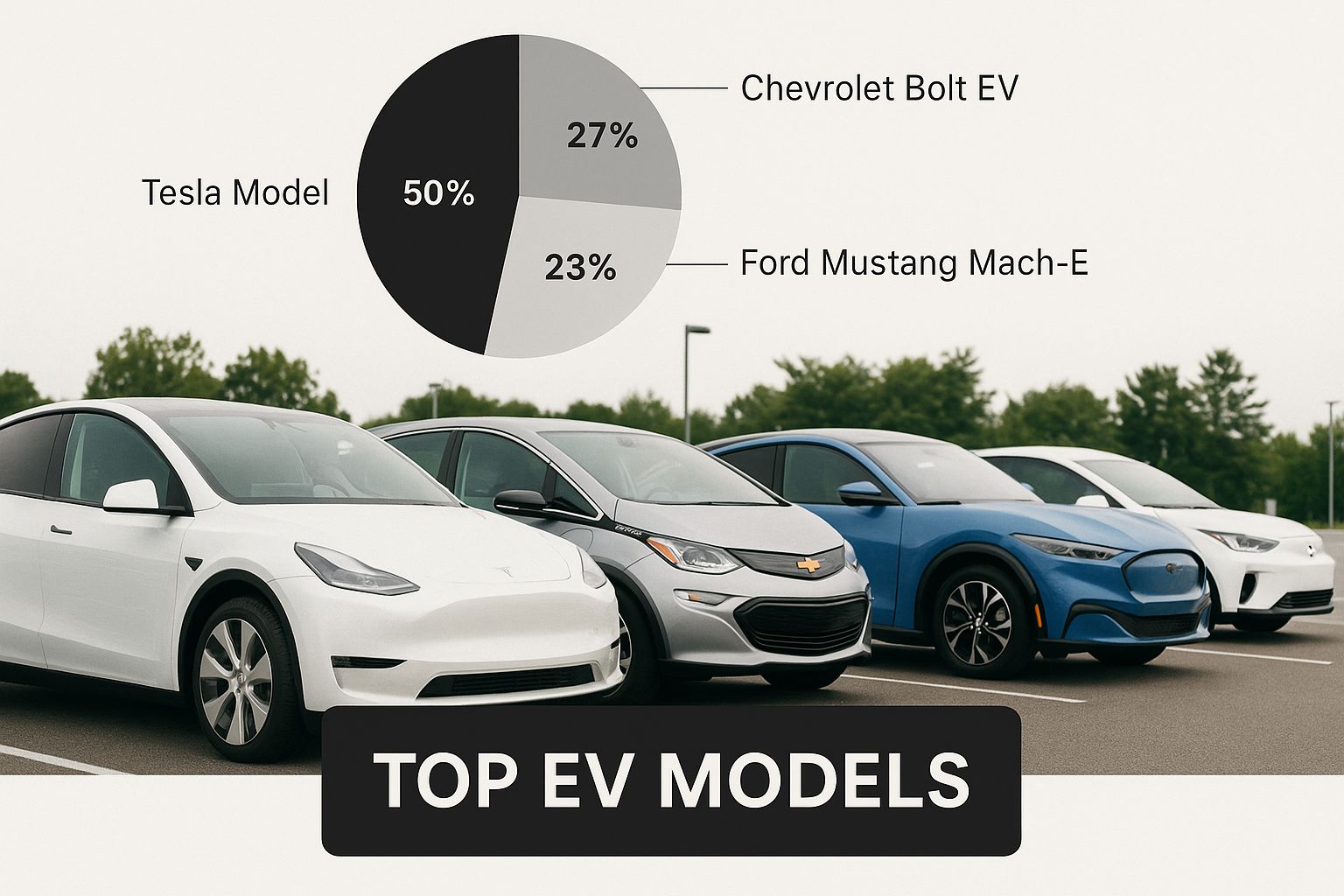
As you can see, the options are growing, from nimble city cars perfect for daily commutes to more rugged models built for Africa’s diverse terrains.
Incentives and Upfront Costs
One of the biggest game-changers for affordability is government support. Many African nations are pushing hard for cleaner transport and are rolling out some pretty substantial incentives to help people make the switch.
What do these incentives look like in practice?
- Tax Breaks: We're talking significant cuts on Value-Added Tax (VAT) and other local taxes tied to buying a vehicle.
- Customs Duty Waivers: In some places, like Rwanda, you'll find a complete exemption from import duties, which can slash the final price of an imported EV.
These policies are specifically designed to tackle that higher initial cost, making an electric car a much more realistic option right from day one.
While the average EV purchase price can hover around $50,000, which is a real barrier for many, new financing products and powerful government incentives are changing the game. These tax breaks and exemptions directly offset the higher upfront cost by dramatically reducing the ongoing expenses for fuel and maintenance. To understand the specifics of these financial dynamics, you can learn more about the Rwanda electric vehicle market.
This mix of lower duties and new EV-specific loans is successfully bringing down the barrier to entry all over the continent.
Charging Costs: Home vs Public
The next huge saving comes from how you "fuel" your car. Electricity is far cheaper and way more stable than the rollercoaster prices we see at the petrol pump.
Charging at home is easily the most wallet-friendly option. You can just plug your car in overnight, often when electricity rates are at their lowest, and wake up to a full "tank" for a fraction of what you'd pay for petrol. It’s convenient and incredibly cheap.
Public charging stations are your other option, great for longer journeys or for those who can’t charge at home. While they cost a bit more than home charging, they’re still significantly cheaper than filling up with petrol. And as the charging network grows, topping up on the go is getting easier all the time.
The Long-Term Savings on Maintenance
Here’s where the financial benefits of owning an EV become impossible to ignore. Electric vehicles are just so much simpler, mechanically speaking, than their petrol-powered cousins. An internal combustion engine (ICE) has hundreds of moving parts that wear down, break, and need constant attention. An electric motor? It has one.
That beautiful simplicity means you can wave goodbye to a whole list of regular maintenance headaches and costs.
- No more oil changes: That recurring expense is gone. Forever.
- No exhaust systems to fix: Forget about rusty mufflers or dodgy catalytic converters.
- Fewer brake replacements: EVs use regenerative braking, which uses the motor to help slow the car. This takes a massive load off your brake pads and discs, making them last much, much longer.
- No spark plugs, belts, or filters: The endless cycle of replacing small but surprisingly expensive engine parts is officially a thing of the past.
To put it all into perspective, let's compare the costs side-by-side.
EV Total Cost of Ownership vs Petrol Car in Africa (5-Year Estimate)
| Cost Factor | Electric Vehicle (EV) | Petrol Vehicle (ICE) | Key Considerations |
|---|---|---|---|
| Purchase Price | $50,000 | $35,000 | Higher upfront cost for EV, but government incentives can reduce this gap significantly. |
| Govt. Incentives | -$7,500 | $0 | Based on potential tax credits, duty waivers, and rebates available in select markets. |
| Fuel Costs | $2,500 | $12,500 | Assumes average mileage and electricity cost of $0.20/kWh vs. petrol at $1.50/litre. |
| Maintenance & Repairs | $1,000 | $5,000 | EVs have far fewer moving parts, eliminating oil changes, spark plugs, etc. |
| Insurance | $6,000 | $5,500 | EV insurance can sometimes be slightly higher due to specialised repair costs. |
| Total 5-Year Cost | $52,000 | $58,000 | Even with a higher purchase price, the EV proves more economical over the long term. |
Over five or ten years, the money you save on maintenance alone adds up to thousands of dollars. When you combine that with the massive savings on fuel, the higher initial investment in an EV doesn't just pay for itself—it can put a substantial amount of money back in your pocket.
How to Find and Buy Your Electric Car
So, you've weighed the costs, seen the benefits, and you're ready to make the switch. The big question now is, where do you actually start looking for electric cars for sale in Africa? This is your practical guide to getting behind the wheel, whether you plan to import a car yourself or buy from a local dealer.
There are really two main paths you can take: bringing a vehicle in from overseas or buying from the growing network of local dealerships. Each route has its own quirks and steps, but both are more straightforward than you might think. Let's walk through them.
The Importation Route Demystified
Importing an electric car directly can feel like unlocking a much bigger showroom. It gives you access to a huge range of models and often better prices, particularly for pre-owned EVs. It might sound daunting, but once you understand the steps, it’s a perfectly manageable process.
The secret is getting the logistics and customs right from the start to avoid any costly surprises down the road.
- Finding a Reputable Seller: Your first step is to find a trusted international seller or marketplace. You’ll want to look for platforms that have a solid track record of exporting vehicles and are completely transparent about their process.
- Logistics and Shipping: After picking your car, you need to get it shipped. Most experienced sellers will help coordinate the transport to the nearest port in your country, which takes a lot of the headache out of it.
- Customs and Duties: This is where you need to do your homework. Every country has different import rules for EVs. The good news is that many African nations now offer massive tax breaks and exemptions on customs duties to encourage people to go electric.
Take Rwanda, for example. The number of electric vehicles imported there shot up from a mere 16 hybrids in 2021 to an incredible 3,726 units in just the first nine months of the next fiscal year. Why the massive jump? A complete exemption from customs duties on EV imports introduced in 2023 was a huge driver.
If you're thinking of buying directly from an international seller, getting comfortable with how to make a secure international money transfer is a crucial part of making the deal happen smoothly.
Buying from Local Dealers and Platforms
If importing feels like too much of a hassle, the local market is your best bet—and it's growing faster than ever. More official dealerships and specialised online platforms are popping up, making it simple to find and buy an EV right here at home.
The big advantage of buying locally is the hands-on experience. You can actually test drive different models, give the car a proper inspection, and have a real person answer your questions on the spot. It also cuts through the red tape, since the dealer takes care of all the importation, customs, and registration paperwork for you.
Platforms like EV24.africa are built to make this entire journey easier. They gather a selection of new and used electric cars specifically suited for the African market, taking the guesswork out of finding a vehicle that fits your needs and your wallet.
No matter which path you choose, always do your due diligence. Check online reviews, insist on a full vehicle history report for any used import, and double-check that all the paperwork is in order. A trustworthy seller will be open and ready to give you all the information you need. Our comprehensive guide on how to buy an electric car in Africa has even more tips to help you out. A little prep work ensures your purchase is not just exciting, but also smart and stress-free.
Navigating The Realities of EV Ownership in Africa
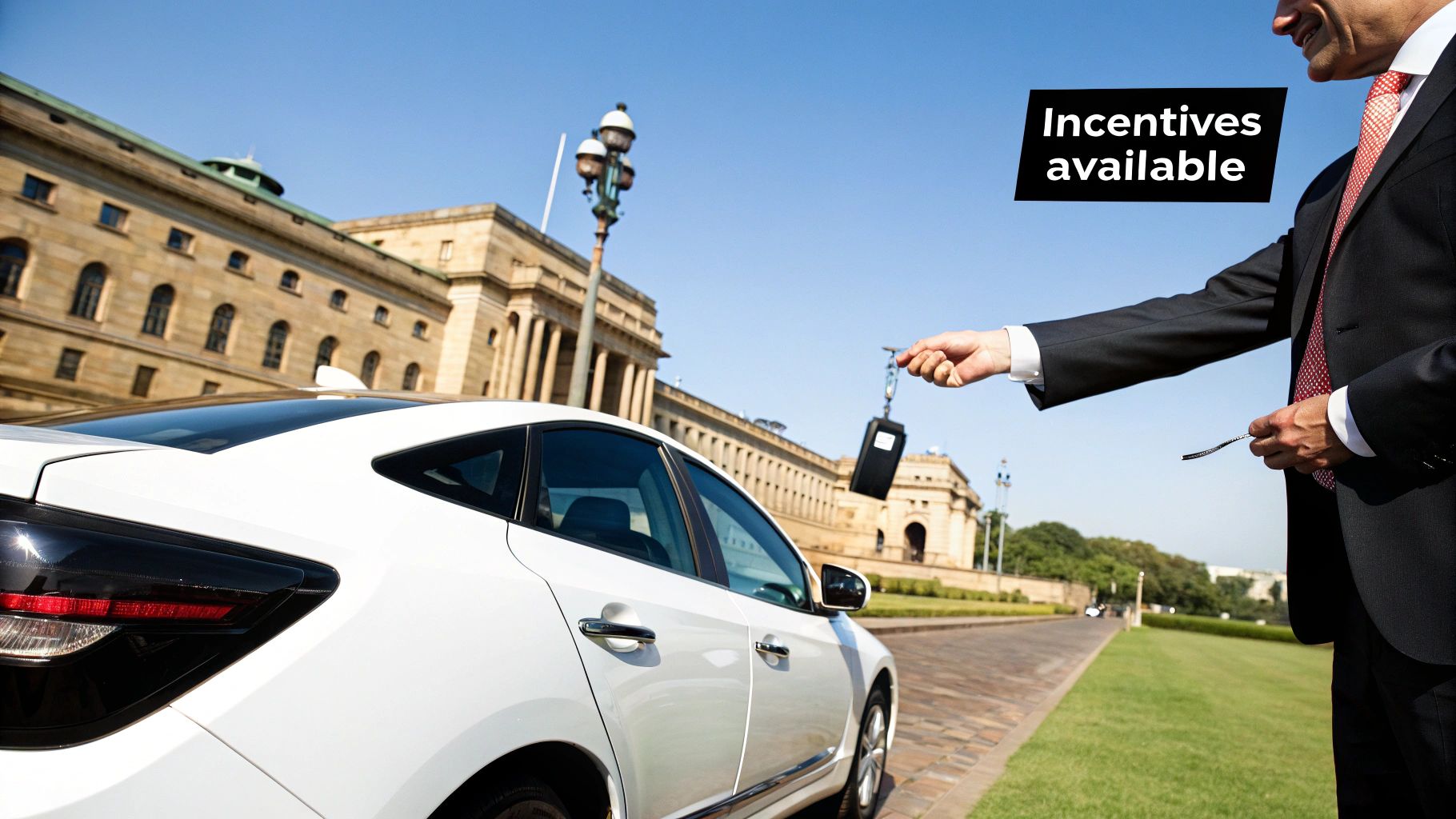
Alright, let's get real about what it's like to own an electric vehicle in Africa. Making the switch is a fantastic move, but it pays to go in with your eyes open. Knowing the challenges isn't about putting you off; it's about making sure you're prepared so you can truly enjoy the ride.
One of the first things that comes to mind for most people is range anxiety. It's that nagging fear of your battery dying before you get where you're going. It's a valid concern, but you'll find it's a lot less of an issue in day-to-day life than you might think.
Today’s EVs can easily cover several hundred kilometres on a full battery. For your daily commute, school run, or errands around town, you’ll have plenty of juice to spare. It just requires a small mental shift—think less about finding the next petrol station and more about simply plugging in at home each night.
Getting a Grip on Charging and Infrastructure
Let's be clear: the biggest hurdle for EV drivers across the continent is charging infrastructure. Public charging points are popping up, especially in bigger cities, but they're not nearly as common as petrol stations yet. This makes one thing non-negotiable: a reliable way to charge at home.
Think of your home charger as your personal fuel pump. It's where your car will get most of its power. Investing in a Level 2 charger is a game-changer, slashing charging times compared to a regular wall outlet and guaranteeing your car is fully charged and ready every morning.
For longer journeys, you just need to plan ahead a little.
- Lean on Apps: Use apps like PlugShare to map out public chargers along your planned route.
- Get to Know Your Car: Learn how driving style, terrain, and even the air conditioning impacts your battery life.
- Plan Your Stops: Build charging stops into your trip. It’s the perfect excuse for a coffee or lunch break.
For those living in areas with less reliable power, off-grid solar power solutions are becoming a popular and practical answer. It's a way to gain energy independence and ensure you can always charge your vehicle, no matter what the grid is doing.
Power Grid Reliability and Finding a Good Mechanic
Speaking of the grid, its stability is another real-world factor to consider. Power cuts can mess with your charging schedule. That’s why many owners get into the habit of charging overnight when demand is lower, and some even install backup power systems for peace of mind.
Then there’s the question of maintenance. EV technology is still fairly new here, so finding a mechanic who knows their way around an electric motor isn't always easy. It's a smart move to figure out your service options before you buy.
Many of the official dealerships bringing EVs to the continent are also setting up certified service centres. Brands like BYD and Hyundai, for instance, aren't just selling cars in markets like South Africa and Kenya—they're building the support network for warranty claims and routine servicing.
As more electric cars for sale in Africa appear on our roads, the pool of expert technicians will grow with it. Doing a bit of research on service centres in your area is a crucial step that will save you headaches down the line and keep your car running smoothly for years.
The Road Ahead for Electric Mobility in Africa
The journey into electric mobility across Africa is really just beginning, but the road ahead looks incredibly promising. What we're seeing today—the spark of interest and the first wave of infrastructure—is just the groundwork for a massive shift in how we move. The future isn't just about more electric cars; it's about better technology, more choice, and a transport system that's cleaner and more self-reliant.
This transition is picking up speed. Soon, the market won't just be about importing whatever models are available elsewhere. We’re on the cusp of seeing new, affordable EVs designed specifically with the African driver in mind. Think rugged electric SUVs with higher ground clearance built for our diverse terrains, or nimble city cars perfect for navigating the busy streets of Nairobi or Lagos.
The Next Generation of EVs
The pace of innovation in the EV world, especially around batteries, is astonishing. The next wave of electric cars will boast much longer ranges, finally putting to rest any lingering "range anxiety." Imagine being able to drive from Kigali all the way to the coast on a single charge—that kind of freedom is closer than you might think.
Charging technology is also taking massive leaps. A charge that currently takes hours will soon be done in minutes, making a long-distance road trip in an EV just as easy as a quick stop for petrol. These advancements will make electric cars for sale in Africa a genuinely practical choice for almost everyone.
The move towards EVs is more than just a new way to drive. It’s a major step towards a cleaner, more innovative, and energy-independent future for the continent. We’re not just changing cars; we’re changing our entire energy landscape for the better.
Powering the Future Sustainably
The real engine behind this electric revolution is Africa’s incredible renewable energy potential. The connection between EVs and solar power, in particular, is a perfect match. By using the continent's abundant sunshine to power our cars, we can build a truly sustainable transport system from the ground up.
This approach does more than just clean the air. It strengthens local economies and frees us from the unpredictability of global fuel prices, creating a much more resilient future. The steady rise in EV sales is a clear sign of this change, and you can dive into the specifics by reading our analysis on the growth of EV sales in Africa.
The path forward isn't just about adopting a new piece of tech. It's about actively shaping a future where getting from A to B is clean, affordable, and powered by the continent itself. Your journey into this exciting new era starts right now.
Your Top Questions About Buying an EV in Africa, Answered
Thinking about making the switch to an electric car? It’s a big step, and you probably have a lot of questions. That's completely normal. We hear them all the time. Let's walk through some of the most common queries we get from people looking at electric cars for sale in Africa.
What Are the Most Popular and Affordable EVs Here?
The landscape is changing fast, which is great news for buyers. For those just entering the market, a used Nissan Leaf or Renault Zoe is often a fantastic, budget-friendly starting point. They've been around for a while and have a proven track record.
If you're looking for something new, brands like BYD are really shaking things up. They're hitting a sweet spot with cars that offer impressive range without the premium price tag. While you can certainly get a Tesla imported, the real secret to an affordable EV lies in local knowledge. Always investigate your country's specific import duties and any government incentives – these can make a massive difference to the final cost.
How Can I Charge My Car if I Live in an Apartment?
This is a huge, practical concern for anyone living in a city. Don't worry, you've got options. The first thing I'd do is scout out public charging stations near your home and office. Apps like PlugShare are brilliant for this; they show you a live map of what's available.
You might also be surprised to find that newer apartment complexes are starting to install shared charging points for residents. It's becoming a key selling point. Another growing trend is workplace charging, so it's worth asking your employer if it's on their radar. The bottom line: have a chat with your building's management and do a little research on your local charging network before you commit.
A reliable charging setup, whether at home or nearby, is what makes owning an EV so convenient. It takes away any anxiety about finding a charger and means you wake up with a full battery every morning.
Are Electric Cars Tough Enough for African Roads?
Yes, they definitely can be. In many ways, they’re even better suited for some of our driving conditions. The instant torque you get from an electric motor is fantastic for zipping through city traffic. Plus, without a heavy engine block up front, many EVs have a lower centre of gravity and more balanced weight distribution, which really improves their handling.
And for those who live with less-than-perfect roads? The market for electric SUVs and crossovers is exploding. You can now find models with higher ground clearance and all-wheel-drive systems built to handle tougher terrain. Just like buying a petrol car, it’s all about picking the right tool for the job.
What Happens to the Battery After a Few Years?
EV batteries are built to last. Most carmakers back them with a warranty for 8-10 years. Over that time, the battery will see some gradual degradation—meaning it might lose a small percentage of its original range—but it will still be more than capable for daily driving.
When a battery eventually falls below the standard needed for a car, it’s not the end of its story. These batteries are often repurposed for a "second life" in energy storage systems, powering homes or businesses. As the EV market grows across Africa, so does the infrastructure for recycling and repurposing, creating a much more sustainable system than you get with traditional cars.
Ready to see what’s out there? At EV24.africa, we take the hassle out of the entire process, from finding a car you’ll love to managing all the importation and delivery logistics. Take a look at our handpicked selection and find your perfect EV today at https://ev24.africa.
Article created using Outrank




